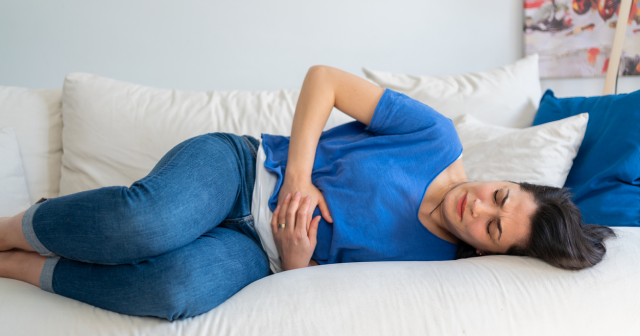You may find you put on weight more easily during the menopause – and that losing weight feels harder than when you were younger.
As well as finding your clothes are a little tighter, you can also be at greater risk of diabetes, heart disease and stroke. This is why it’s very important to manage your weight during menopause.
Discover how best to maintain a healthy weight – and lose weight if you need to – during menopause through a combination of lifestyle changes.
Why weight loss is hard during the menopause
-
Hormonal changes are one of the reasons you may gain weight during the period leading up to menopause – known as perimenopause – and even after the menopause.
This natural stage of your life, which usually happens between age 45 and 55, sees your levels of the hormones oestrogen and progesterone going down and your ovaries releasing fewer eggs (ovulating), until you eventually stop ovulating and your periods stop for good.
As you approach the menopause (when you haven’t had your period for 12 months), the hormonal changes your body experiences may make you more likely to put on weight around your tummy (abdomen), rather than on your hips and thighs as you did when you were younger.
-
The ageing process. As you age, you lose muscle mass (which means you’re burning less calories and may find it hard to keep off the pounds) – at the same time you gain fat. The lack of oestrogen means that your body finds it more difficult to handle insulin, causing food cravings. You tend to become insulin-resistant too, which means that your body stores calories, rather than burns them.
-
Lifestyle and life stage. You may also find that with many calls on your time from being part of the ‘sandwich generation’, looking after elderly parents and teens, to managing a demanding career – you’re exercising less.
-
The psychological impact of the menopause, and middle age in general, may also see you gaining weight, as some people may experience mood swings, anxiety, low self-esteem and feel more stressed, which may lead to more eating and drinking.
But it’s not inevitable that you will gain weight.
Follow these 4 guidelines to manage your weight during perimenopause and postmenopause.
Read more about 8 unusual menopause symptoms to look out for.
4 ways to lose weight during menopause
1. Eat healthily
To maintain a healthy weight or lose weight during menopause, aim to:
- follow a healthy, balanced diet
- stick to regular meals (don’t skip breakfast)
- eat plenty of fruit and vegetables
- eat more fibre in your diet
- drink water and other healthy drinks
- plan your meals so you don’t overeat
As a bonus, sticking to a healthy diet can also help:
- menopause hair loss or thinning
- support bone health at a time when you’re at increased risk of osteoporosis – eat the right food for strong bones and take on board calcium and vitamin D every day
Try these tips:
- swap sugary, fatty and processed foods for whole foods and naturally sweet treats to make sure you don’t gain weight, and to keep that tummy, or belly fat away. Read more about how to cut down on sugar and how to lose belly fat
- keep an eye on your portion sizes because you need less food than you used to. Most women need less than a male partner so be aware that you don’t need to dish up equal portions. Eat filling fibre and protein at every meal to stay fuller for longer even if your portion is smaller - try protein such as eggs, nuts, lean meat and fish, low fat dairy yoghurt and cheese and high fibre foods such as oats, apples, blueberries, wholegrain rice, pulses, carrots, cucumber, tomatoes
- try to eat more slowly and savour every mouthful of flavour - at mealtimes your gut suppresses your hunger hormone and tells your brain you are full, a process that takes about 20 minutes. Challenge yourself to chew each mouthful ten times – and be mindful of what and when you’re eating, so don’t eat while watching TV, for example
- think ahead when you eat out – manage situations where you may overeat, like eating in restaurants or during the festive season. Read more about healthy holiday food swaps. It can also be helpful to have more low sugar non-alcoholic drinks such as slimline tonic or fizzy water with lime or cucumber water. This helps you feel fuller and also cut down the amount of alcohol you drink, as most alcoholic beverages are high in sugar and calories. Alcohol can also trigger hot flushes when you’re going through the menopause, as can caffeine and spicy foods, so cut down on these

2. Get active
Moving more is one of the most basic ways you can manage and lose weight during menopause. And by keeping fit, building your strength and following a healthy diet, you may also find that menopause symptoms, including hot flushes, night sweats and weak bones, improve.
It’s important to find a way to keep active and fit that you enjoy and that you’ll stick to. What this is and how much you need to do to lose or maintain your weight varies from person to person. However, it’s generally recommended that adults try to do at least:
- 150 minutes of moderate intensity exercise a week (such as riding a bike, brisk walking or water aerobics), or
- 75 minutes of vigorous intensity activity (such as running, swimming or aerobics)
It’s also important to do strengthening exercises that work all your major muscle groups and strengthen your bones, like weight training or any weight-bearing exercises where you push, pull, lift or hold some sort of resistance, such as your own body weight, like yoga or dance.
Read more about how to make daily exercise a habit and exercises to lose belly fat.
3. Get quality sleep
Try to get enough sleep (ideally 7 to 9 hours a night), because not getting enough sleep may lead to you putting on weight. It’s thought that sleep deprivation lowers your levels of leptin, which is the chemical that makes you feel full, and increases the amount of ghrelin in your body, which is the hormone that makes you feel hungry.
Read more about menopause and insomnia.
4. Find a way to relieve your stress
Reducing your stress levels can help with weight loss and management. Stress can lead to weight gain because cortisol, the hormone that’s activated when you’re stressed, encourages belly fat. You may also eat more and exercise less when you’re stressed.
Lowering your stress levels can also help with other menopausal symptoms, such as anxiety, insomnia and heart palpitations.
Good ways to relieve your stress include:
- calming breathing exercises
- mindfulness meditation
- exercising regularly
- talking about your feelings to a family member, friend or health professional
Some research shows that doing yoga during menopause may be helpful for lowering your stress levels.
Want to find a way to eat better, get fitter, improve your sleep and feel happier? Try the 4 new 28 day plans in the Healthily app and get scientifically proven strategies for achieving your health goals, plus daily tracker stats and weekly progress reports, to keep you motivated. Simply download the app to find out more.

Safety tips for losing weight during or after menopause
Losing weight is different for everyone. But the best way to lose weight – and keep the weight off – is to adopt a healthy lifestyle.
There are some additional general guidelines that are good to follow to ensure you’re losing weight at a safe and sustainable rate of 0.5 to 1kg a week, which include:
- making sure you don’t go without food for long periods of time or cut out whole food groups from your diet. This can cause you to become unwell and fall into bad eating habits
- staying away from very low-calorie diets, where you consume less than 800 calories a day. These can cause you to lose a lot of weight very quickly, but they’re not a safe and sustainable way to lose weight
Read more about how to lose weight safely.
It’s best to speak to a doctor about how to lose weight safely if you’re obese (when your body mass index, or BMI is 30 and above).
Can menopause cause weight loss?
Menopause doesn’t generally cause weight loss – it’s usually the opposite.
If you lose a lot of weight in a short amount of time, it’s usually due to a stressful life event, like bereavement, divorce or redundancy, but once this has passed, you usually return to a healthier weight.
However, unexpected weight loss can also be caused by something more serious, including:
- depression
- cancer
- an overactive thyroid (hyperthyroidism)
- an eating disorder, like anorexia or bulimia
Speak to a doctor if you’re losing a lot of weight, especially if you’re also:
- feeling tired
- losing your appetite
- getting ill more regularly
- noticing a change in your toilet habits
Key takeaways
- if you’re going through menopause, you’re more likely to gain weight than to lose it
- hormonal and lifestyle changes may lead to weight gain during the menopause
- the best way to manage a healthy weight is through diet, exercise, stress reduction and getting enough sleep
- if you make diet changes, make sure you’re getting enough calories and nutrients
- see your doctor if you’re losing a lot of weight, especially if it’s in a short period of time
Need tips on how to get active? Try out our 28-day in-app get fitter plan for all the latest hacks on how to work more exercise into your daily routine. Currently available on iOS only.






